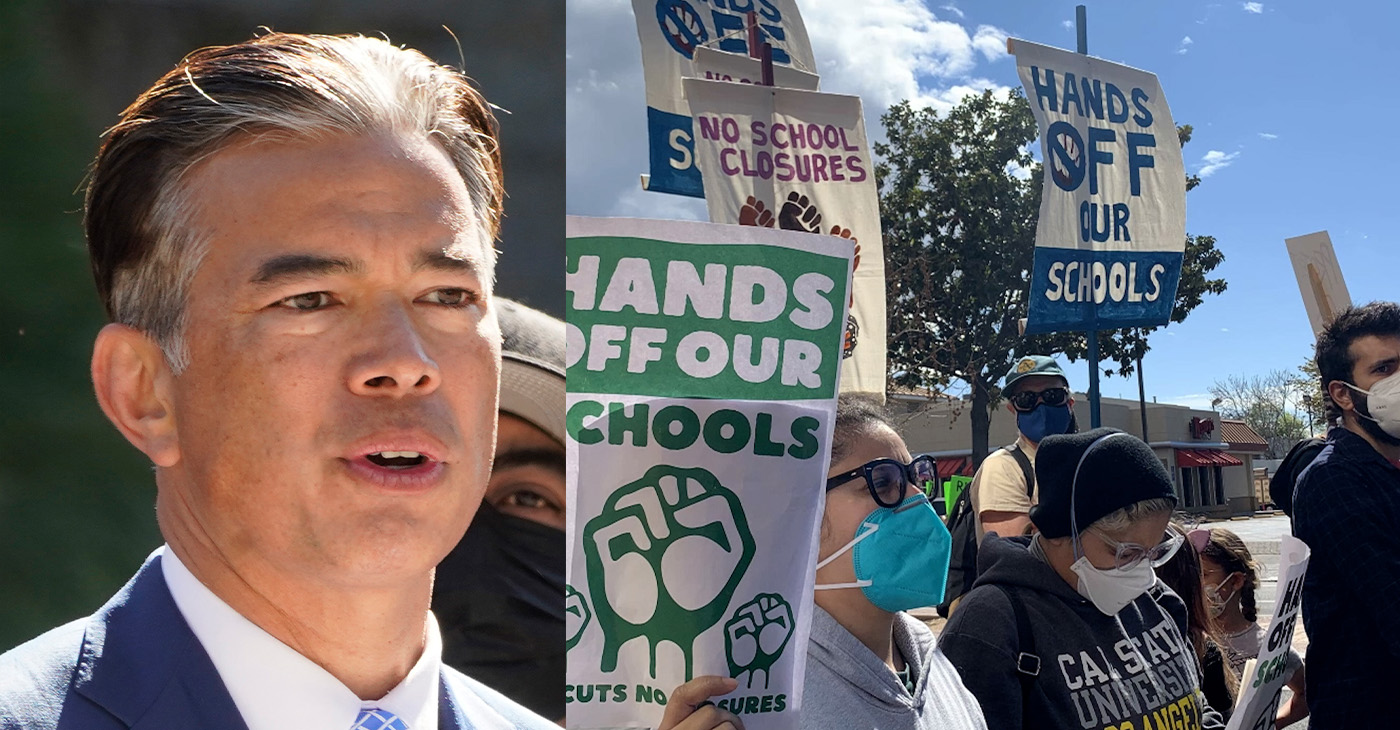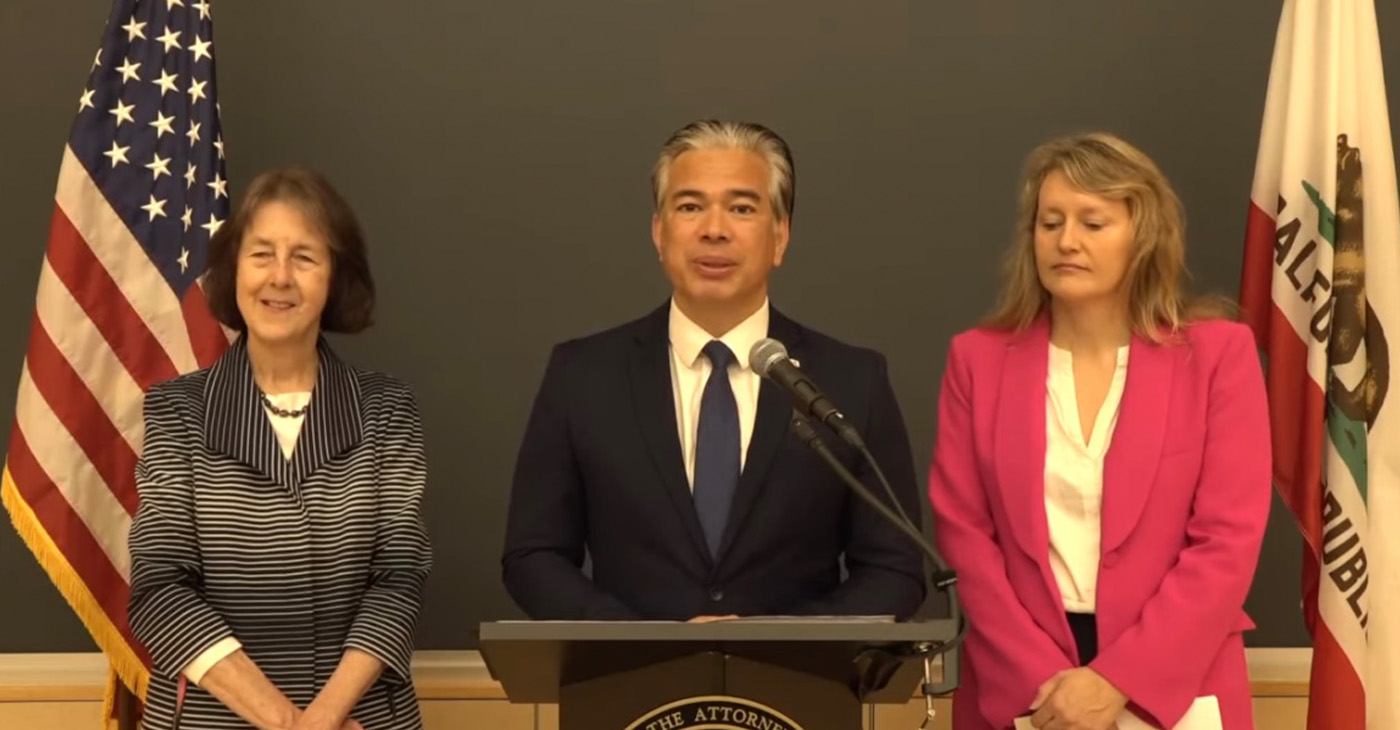Community
California Voters Give Schools, Teachers Top Grades in Year-End Survey
However, on most issues in the survey, Democrats and Republicans generally disagreed. One notable issue was whether schools should spend more time teaching about the causes and consequences of racism and inequality.

Despite perceptions of the public’s widespread unhappiness with the slow reopening of California’s schools last spring, most voters surveyed, including parents, gave the highest marks in a decade of polling to the state’s public schools in general and their schools in particular.
However, on most issues in the survey, Democrats and Republicans generally disagreed. One notable issue was whether schools should spend more time teaching about the causes and consequences of racism and inequality.
At the same time, they also expressed worry about the effects of the pandemic on children and said they would strongly support various measures to accelerate student learning, including hiring counselors and providing intensive tutoring and summer school.
The independent, nonpartisan research center PACE and the USC Rossier School of Education released their ninth annual poll on education on July 8. The survey firm Tulchin Research solicited views of 2,000 registered California voters representative of the state’s demographics and party affiliation, with an oversampling of 500 parents with children under 18 living at home. Surveys were conducted in English and Spanish.
Researchers chose May, with schools winding down after a partial return to in-person instruction, because it enabled participants to reflect on the year and look ahead, said Heather Hough, PACE’s executive director.
Given widespread news reports showing anger and mistrust toward schools, Hough said she expected more criticism. Instead, a record 38% of voters overall and 53% of parents gave A or B grades to schools statewide; 51% of voters and 61% of parents gave A or B to their local public schools.
One of the researchers characterized this as “grading on a curve,” Hough said, giving credit to schools for the efforts they made during a difficult year.
The disparity was wide among voters by party, however, with 29% of Republicans giving schools statewide an A or B and 41% giving a D or F, compared with 47% of Democrats giving an A or B and only 17% giving schools statewide a D or F. The rest gave schools a C.
The majority of voters and parents gave A or B to teachers and superintendents, and 69% of parents said they would encourage a young person to become a teacher, an increase from 60% from the last poll, which was taken pre-pandemic, in January 2020.
Voters were presented a list of the potential areas of concern because of the pandemic’s impact on students and asked to rate them 1 to 10, with 10 being “very important.” Voters overall cited students falling behind academically as the most pressing issue, with the impact on English learners and special education students a close second. Parents cited the impact on emotional and mental health as No. 1, which was third for all voters.
Voters’ experiences during the pandemic varied significantly by income, and, to an extent, by race and ethnicity. Confirming what other surveys have indicated, lower-income families were the hardest hit: for families earning under $35,000 per year, 37% said their income worsened and 14% said it improved during the pandemic; for families earning more than $150,000, it was the opposite: 30% said their income had improved and 17% said it worsened.
Asked to describe their children’s educational experience during the pandemic, 58% of families earning under $75,000 said it had gotten worse, compared with 48% of families earning more than $150,000; 39% of those earning more than $150,000 said it had gotten better, compared with 26% of families earning less than $35,000.
Divided on race and politics
California voters reflected the tensions nationally on issues of race and politics, though they downplayed the divisions locally: 78% said the state has become more divided politically, and 70% said the state has become more divided on matters of race. But slightly fewer than half said those political and racial tensions had increased locally.
Asked if the problem of discrimination and violence based on racial and ethnic differences has gotten worse, 69% said it had statewide while 48% said it had locally; 64% of Black voters said the problem has worsened, compared with 46% of non-Black voters.
Voters were given a dozen educational issues and were asked to rank their importance, from 1 to 10 (very important). The top issue was reducing gun violence in schools, although the rate of incidents is small nationally and in California, with 65% of Democrats and 37% of Republicans ranking it very important.
The next four issues, all closely ranked, were making college more affordable, improving special education services, reducing the teacher shortage and supporting struggling schools.
More Democrats than Republicans designated the issues to be very important. On improving education funding, for example, 43% of Democrats ranked it very important, compared with 25% of Republicans. The one exception was improving school discipline; a third of Republicans ranked it very important, compared with a quarter of Democrats.
Asked whether more or less time should be spent on “grade-appropriate” lessons on racism and inequality, 39% of Democrats backed giving the issues much more time compared with 10% of Republicans, while 37% of Republicans and 3% of Democrats said there should be much less time.
“Many Californians support steps to acknowledge and address persistent inequities, in the curriculum and otherwise, but stark partisan differences portend ongoing conflict in the pursuit of these goals,” the authors of the poll concluded. Along with Hough, they were Julie Marsh, a professor of education policy at USC Rossier School of Education; Jeannie Myung, director of policy research at PACE; David Plank, a senior fellow at PACE, and Morgan Polikoff, an associate professor of education at the USC Rossier School of Education.
On other questions:
69% of voters support requiring COVID-19 vaccinations for school-age children, once approved by the FDA and medical exemptions are allowed; 43% strongly favor the idea. Strongest in support were Democrats, high-income earners and Asian American voters. Least supporting were Republicans, low-income earners and Black voters, although in all groups, there was a majority support.
71% of parents and 59% of all voters favored making online learning from home an option for all students in California public schools, even after the pandemic ends.
58% of voters, but only 49% of parents favor the resumption of standardized testing, but 43% of parents want testing either eliminated (18%) or reduced, such as once in elementary school and once in high school. (In spring 2020, the tests for most students were canceled, and in spring 2021, they were optional for districts.)
Community
AG Bonta Says Oakland School Leaders Should Comply with State Laws to Avoid ‘Disparate Harm’ When Closing or Merging Schools
California Attorney General Rob Bonta sent a letter this week to the Oakland Unified School District (OUSD) Board of Education saying the district has a duty to comply with state education and civil rights laws to protect students and families from “disparate harm,” such as segregation and discrimination, if the district goes ahead with school closures, mergers or consolidations in 2025-2026.

AG Bonta said DOJ investigation of 2022 closure decisions would have negatively impacted Black and low-income families.
By Post Staff
California Attorney General Rob Bonta sent a letter this week to the Oakland Unified School District (OUSD) Board of Education saying the district has a duty to comply with state education and civil rights laws to protect students and families from “disparate harm,” such as segregation and discrimination, if the district goes ahead with school closures, mergers or consolidations in 2025-2026.
The letter and an accompanying media release announced the findings of the California Department of Justice’s (DOJ) investigation into the OUSD Board’s Feb. 8, 2022, decision to close Parker Elementary, Brookfield Elementary, Carl B. Munck Elementary, Fred T. Korematsu Discovery Academy, Grass Valley Elementary, Horace Mann Elementary, and Community Day School and eliminate grades 6-8 of Hillcrest Elementary and La Escuelita Elementary.
“All school districts and their leadership have a legal obligation to protect vulnerable children and their communities from disparate harm when making school closure decisions,” said Attorney General Bonta.
“The bottom line is that discrimination in any form will not be tolerated,” he said. “I am committed to working with OUSD’s leadership to achieve successful outcomes for students.
“My office will continue to monitor OUSD’s processes and decision-making as it moves forward with the required community engagement, equity impact analysis, and planning to implement any future closures, mergers, or consolidations” to ensure compliance with California’s Constitution, AB 1912, and anti-discrimination laws.
By press time, the school district did not respond to a request for comment from OUSD.
The DOJ’s findings showed that the February 2022 decision, later partially rescinded, would have disproportionately impacted Black and low-income elementary students, as well as high-need students with disabilities, according to the media release.
The Attorney General outlined concerns about criteria OUSD has announced that it may rely on to determine future closures, mergers, and consolidations and provided recommendations to ensure OUSD does not violate state law, including prohibitions against closure decisions that reinforce school segregation or disproportionately impact any student group as required by the State Constitution, AB 1912, and anti-discrimination laws.
According to AB 1912, passed in September 2022, financially distressed school districts contemplating school closures, mergers, or consolidations must engage the community before closing schools; conduct an equity impact assessment; and provide the public with the set of criteria the district plans to utilize to make decisions.
In the letter, DOJ identified a “problematic” approach to planning for closing schools in 2025-2026 and “strongly recommends” steps OUSD should take going forward.
- “Take affirmative steps to ensure that its enrollment and attendance boundary and school closure decisions alleviate school segregation and do not create disproportionate transportation burdens for protected subgroups.”
- Don’t solely utilize criteria such as school facilities’ conditions, school operating costs, and school capacity without also including an assessment of past and present inequities in resources “due to educational segregation or other causes.”
- Some of OUSD’s proposed guidelines “may improperly penalize schools serving students with disabilities and students who have high needs.”
- The district’s decisions should also include “environmental factors, student demographics and feeder attendance patterns, transportation needs, and special programs.”
- Avoid overreliance on test scores and other quantitative data without also looking at “how each school is serving the needs of its specific student body, especially as it relates to historically marginalized communities.”
- “Engage an independent expert to facilitate community input and equity impact.”
The letter also emphasized that DOJ is willing to provide “feedback and consultation at any time during the process to ensure that OUSD’s process and outcomes are legally compliant and serve the best interests of the school community and all of its students.”
Community
Attorney General Rob Bonta, Oakland Lawmakers, Introduce Legislation to Protect Youth Online
At a press conference in downtown Oakland on Jan. 29, Attorney General Rob Bonta joined Sen. Nancy Skinner (D-Berkeley) and Assemblymember Buffy Wicks (D-Oakland) to announce two pieces of legislation designed to protect children online. The bills are Senate Bill (SB) 976, the Protecting Youth from Social Media Addiction Act and Assembly Bill (AB) 1949, the California Children’s Data Privacy Act.

By Magaly Muñoz
At a press conference in downtown Oakland on Jan. 29, Attorney General Rob Bonta joined Sen. Nancy Skinner (D-Berkeley) and Assemblymember Buffy Wicks (D-Oakland) to announce two pieces of legislation designed to protect children online.
The bills are Senate Bill (SB) 976, the Protecting Youth from Social Media Addiction Act and Assembly Bill (AB) 1949, the California Children’s Data Privacy Act.
Skinner authored SB 976, which addresses online addiction affecting teenage users, while Wicks’s bill, AB 1949, takes on big tech by proposing data privacy and children rights protections.
“Social media companies unfortunately show us time and time again that they are all too willing to ignore the detriment to our children, the pain to our children, the mental health and physical challenges they face, in order to pursue profits,” Bonta said.
SB 976 would allow parents to control the nature and frequency of the content their under-18-year-old children see on social media. Notifications from social media platforms would also be paused from midnight to 6 am and controls would allow parents to set time limits on their children’s usage based on their discretion.
Skinner stated that the longer that kids are on their phones during the day, the higher the risk for depression, anxiety and other related issues.
The bill would also push to get rid of addictive media that is harmful for young women and girls, specifically image filters that mimic cosmetic plastic surgery.
Bonta and 33 other attorney generals had previously filed a lawsuit against Meta, owner of the popular social media applications Instagram and Facebook. The filing claims that the company purposefully uses algorithmized content that harms younger audiences.
“Social media companies have the ability to protect our kids, they could act, but they do not,” Skinner said.
The Child Data Privacy Act would strengthen existing protections for data privacy under the California Consumer Privacy Act (CCPA). The lawmakers argue that the law does not have effective protection for those under 18 years old.
Wicks stated that the bill would forbid businesses from collecting, using, sharing, or selling personal data of anyone underage unless they receive informed consent, or it becomes necessary for the purpose of the business.
Wicks added that the acts would make it so that a search on the internet like “How do I lose weight?” would not result in dieting pill advertisements targeting youth, which, some experts report, could be harmful to their mental and physical health.
“In a digital age where the vulnerabilities of young users are continually exploited, we cannot afford to let our laws lag behind, our children deserve complete assurance that their online experience will be safeguarded from invasive practices,” Wicks said.
Supporters of the two acts say they have gained bipartisan support issue, but the authors and Bonta expect them to be met with pushback from the affected companies.
Art
Marin County: A Snapshot of California’s Black History Is on Display
The Marin County Office of Education, located at 1111 Las Gallinas Ave in San Rafael, will host the extraordinary exhibit, “The Legacy of Marin City: A California Black History Story (1942-1960),” from Feb. 1 to May 31, 2024. The interactive, historical, and immersive exhibit featuring memorabilia from Black shipyard workers who migrated from the South to the West Coast to work at the Marinship shipyard will provide an enriching experience for students and school staff. Community organizations will also be invited to tour the exhibit.

By Post Staff
The Marin County Office of Education, located at 1111 Las Gallinas Ave in San Rafael, will host the extraordinary exhibit, “The Legacy of Marin City: A California Black History Story (1942-1960),” from Feb. 1 to May 31, 2024.
The interactive, historical, and immersive exhibit featuring memorabilia from Black shipyard workers who migrated from the South to the West Coast to work at the Marinship shipyard will provide an enriching experience for students and school staff. Community organizations will also be invited to tour the exhibit.
All will have the opportunity to visit and be guided by its curator Felecia Gaston.
The exhibit will include photographs, articles and artifacts about the Black experience in Marin City from 1942 to 1960 from the Felecia Gaston Collection, the Anne T. Kent California Room Collection, The Ruth Marion and Pirkle Jones Collection, The Bancroft Library, and the Daniel Ruark Collection.
It also features contemporary original artwork by Chuck D of the Rock and Roll Hall of Fame group Public Enemy, clay sculptures by San Francisco-based artist Kaytea Petro, and art pieces made by Marin City youth in collaboration with Lynn Sondag, Associate Professor of Art at Dominican University of California.
The exhibit explores how Marin City residents endured housing inequities over the years and captures the history of plans to remove Black residents from the area after World War II. Throughout, it embodies the spirit of survival and endurance that emboldened the people who made Marin City home.
Felecia Gaston is the author of the commemorative book, ‘A Brand New Start…This is Home: The Story of World War II Marinship and the Legacy of Marin City.’ Thanks to the generous contribution of benefactors, a set of Felecia’s book will be placed in every public elementary, middle, and high school library in Marin.
In addition, educators and librarians at each school will have the opportunity to engage with Felecia in a review of best practices for utilizing the valuable primary sources within the book.
“Our goal is to provide students with the opportunity to learn from these significant and historical contributions to Marin County, California, and the United States,” said John Carroll, Marin County Superintendent of Schools.
“By engaging with Felecia’s book and then visiting the exhibit, students will be able to further connect their knowledge and gain a deeper understanding of this significant historical period,” Carroll continued.
Felecia Gaston adds, “The Marin County Office of Education’s decision to bring the Marin City Historical Traveling Exhibit and publication, ‘A Brand New Start…This is Home’ to young students is intentional and plays a substantial role in the educational world. It is imperative that our community knows the contributions of Marin City Black residents to Marin County. Our youth are best placed to lead this transformation.”
The Marin County Office of Education will host an Open House Reception of the exhibit’s debut on Feb. 1 from 4 p.m. – 6 p.m.. All school staff, educators, librarians, and community members are encouraged to attend to preview the exhibit and connect with Felecia Gaston. To contact Gaston, email MarinCityLegacy@marinschools.org
-

 Activism4 weeks ago
Activism4 weeks agoOakland Post: Week of March 20 – 26, 2024
-

 #NNPA BlackPress3 weeks ago
#NNPA BlackPress3 weeks agoMayor, City Council President React to May 31 Closing of Birmingham-Southern College
-

 #NNPA BlackPress3 weeks ago
#NNPA BlackPress3 weeks agoCOMMENTARY: D.C. Crime Bill Fails to Address Root Causes of Violence and Incarceration
-

 #NNPA BlackPress3 weeks ago
#NNPA BlackPress3 weeks agoFrom Raids to Revelations: The Dark Turn in Sean ‘Diddy’ Combs’ Saga
-

 #NNPA BlackPress3 weeks ago
#NNPA BlackPress3 weeks agoCOMMENTARY: Lady Day and The Lights!
-

 #NNPA BlackPress3 weeks ago
#NNPA BlackPress3 weeks agoBaltimore Key Bridge Catastrophe: A City’s Heartbreak and a Nation’s Alarm
-

 #NNPA BlackPress3 weeks ago
#NNPA BlackPress3 weeks agoBaltimore’s Key Bridge Struck by Ship, Collapses into Water
-

 Activism3 weeks ago
Activism3 weeks agoOakland Post: Week of March 27 – April 2, 2024











































